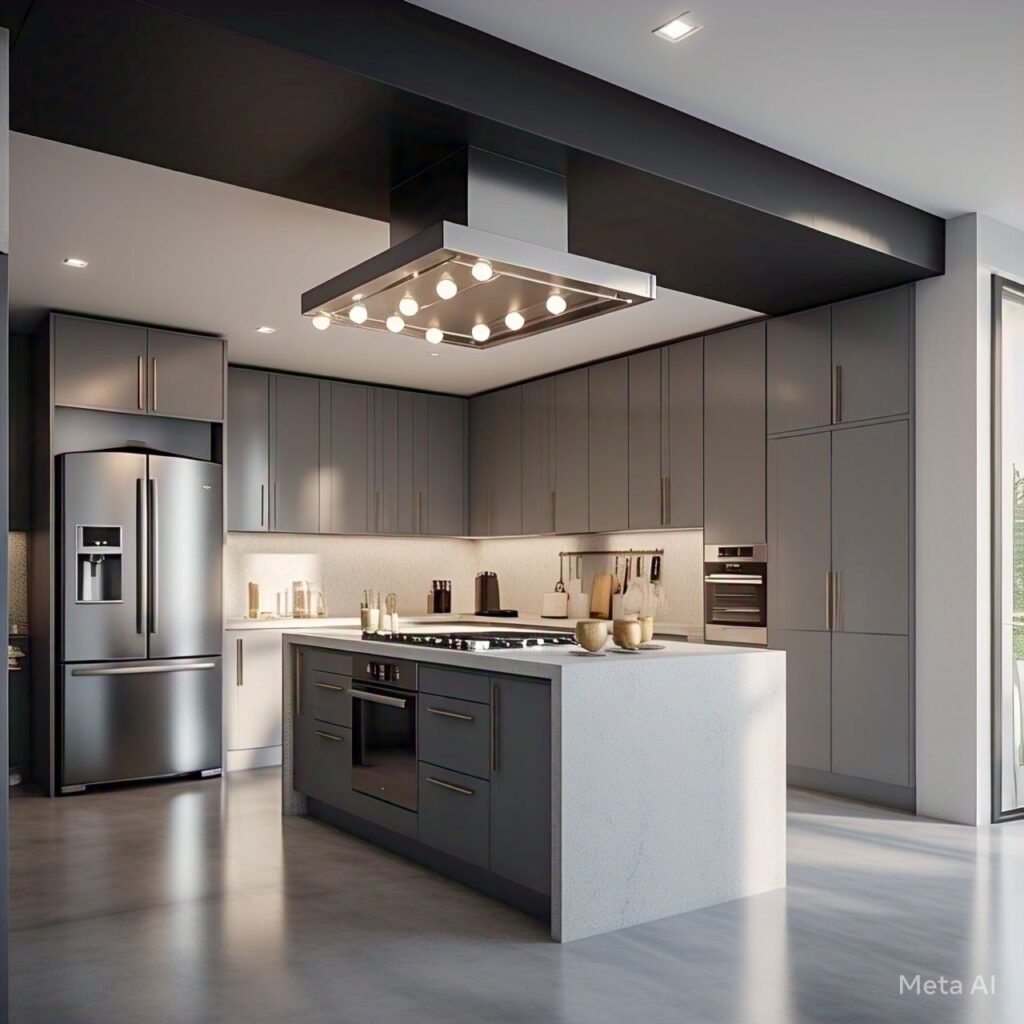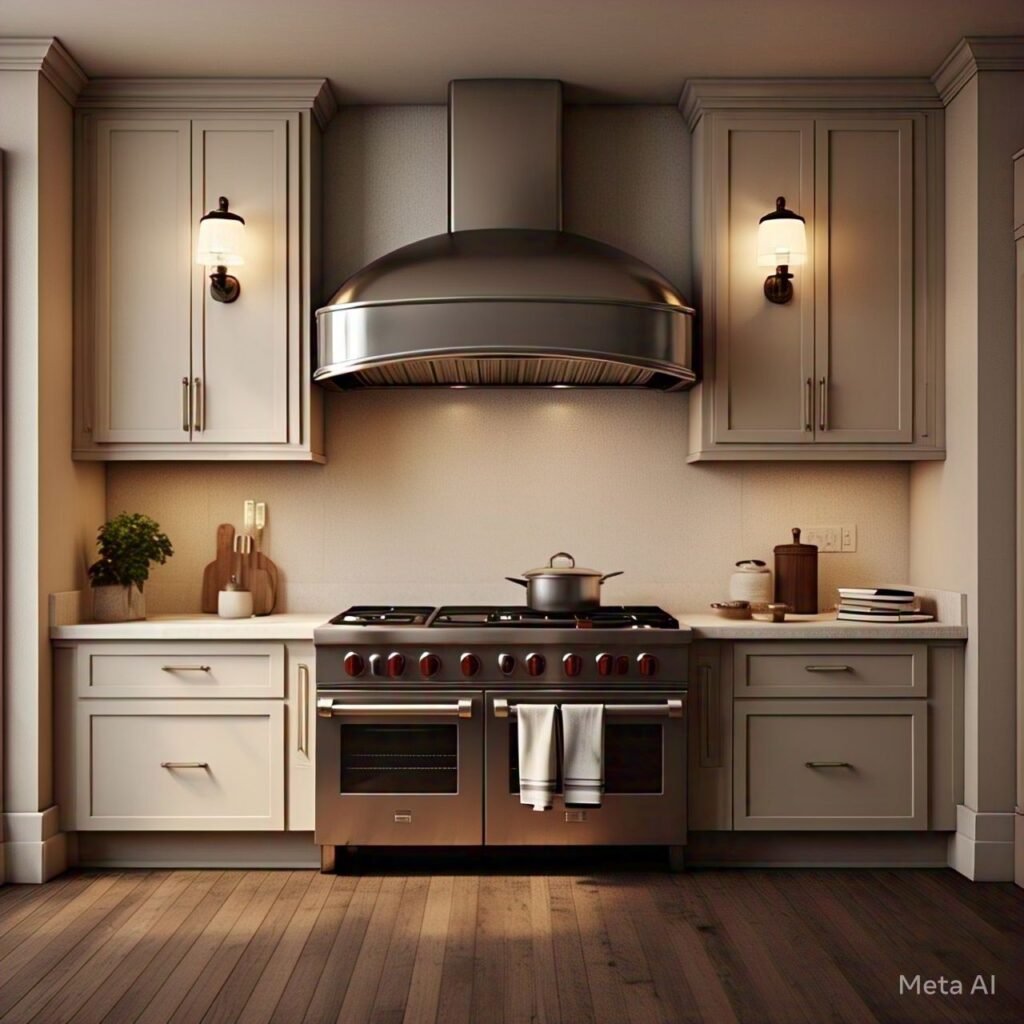When it comes to kitchen design and functionality, kitchen hood lights often play a crucial role. They not only illuminate your cooking space but also add a touch of modernity to your kitchen. However, a common question many homeowners ask is, Do kitchen hood lights really need to turn off? The answer isn’t as straightforward as you might think. In this blog post, we’ll dive deep into the importance of kitchen hood lights, whether they need to be turned off, and what you should know to make the most of them.
What Are Kitchen Hood Lights?
Kitchen hood lights are integrated lighting systems installed in range hoods above your stove. They are designed to provide focused illumination on your cooking area, making it easier to prepare meals, especially in low-light conditions. These lights are typically LED or halogen bulbs, known for their energy efficiency and brightness.
But beyond their practical purpose, kitchen hood lights also contribute to the overall ambiance of your kitchen. Whether you’re sautéing vegetables or hosting a dinner party, the right lighting can make all the difference.
Do Kitchen Hood Lights Really Need to Turn Off?
The short answer is yes, kitchen hood lights should be turned off when not in use. While it might seem convenient to leave them on, doing so can lead to several issues, including increased energy consumption, reduced bulb lifespan, and even safety concerns.
Let’s break it down further:
1. Energy Efficiency
Leaving your kitchen hood lights on unnecessarily can significantly increase your energy bills. Even though LED bulbs are energy-efficient, continuous usage adds up over time. Turning them off when you’re done cooking is a simple way to save energy and reduce costs.
2. Prolonging Bulb Lifespan
Every light bulb has a limited lifespan, measured in hours of use. The more you use your kitchen hood lights, the quicker they’ll burn out. By turning them off when not needed, you can extend their lifespan and avoid frequent replacements.
3. Safety Concerns
While rare, leaving kitchen hood lights on for extended periods can pose a fire hazard, especially if the hood is near flammable materials. Turning them off when not in use minimizes this risk and ensures a safer cooking environment.
When Should You Leave Kitchen Hood Lights On?
While it’s generally recommended to turn off kitchen hood lights when not in use, there are a few scenarios where leaving them on might be beneficial:
1. During Extended Cooking Sessions
If you’re preparing a multi-course meal or hosting a dinner party, you might need continuous lighting. In such cases, leaving the kitchen hood lights on can help you maintain visibility and focus.
2. For Ambiance and Aesthetics
Kitchen hood lights can enhance the overall look of your kitchen. If you’re entertaining guests or want to create a cozy atmosphere, leaving the lights on can add a warm and inviting touch.
3. Nighttime Use
If your kitchen lacks adequate lighting, leaving the kitchen hood lights on at a low intensity can serve as a nightlight, making it easier to navigate the space without turning on brighter overhead lights.

Tips for Using Kitchen Hood Lights Efficiently
To make the most of your kitchen hood lights while minimizing energy consumption and wear, consider the following tips:
1. Install a Timer or Motion Sensor
Adding a timer or motion sensor to your kitchen hood lights ensures they only turn on when needed and automatically shut off after a set period. This is especially useful for forgetful homeowners.
2. Use LED Bulbs
LED bulbs are more energy-efficient and have a longer lifespan compared to traditional incandescent or halogen bulbs. Switching to LEDs can save you money in the long run.
3. Clean the Lights Regularly
Dust and grease can accumulate on kitchen hood lights, reducing their brightness and efficiency. Regular cleaning ensures they function optimally and last longer.
4. Adjust the Brightness
If your kitchen hood lights come with dimming options, use them to adjust the brightness according to your needs. Lower brightness levels consume less energy and create a more relaxed ambiance.
Common Myths About Kitchen Hood Lights
There are several misconceptions surrounding kitchen hood lights. Let’s debunk a few of them:
1. “Leaving Kitchen Hood Lights On Saves Energy”
Some people believe that turning lights on and off frequently uses more energy than leaving them on. However, this is a myth. Turning off kitchen hood lights when not in use is always more energy-efficient.
2. “All Kitchen Hood Lights Are the Same”
Kitchen hood lights come in various types, including LED, halogen, and incandescent. Each has its own pros and cons, so it’s important to choose the right one for your needs.
3. “Kitchen Hood Lights Don’t Need Maintenance”
Like any other appliance, kitchen hood lights require regular maintenance to function efficiently. Neglecting them can lead to reduced performance and higher energy costs.
How to Choose the Right Kitchen Hood Lights
If you’re in the market for new kitchen hood lights, here are a few factors to consider:
1. Brightness and Color Temperature
Choose lights that provide adequate brightness for your cooking needs. Warm white lights (2700K-3000K) are ideal for a cozy ambiance, while cool white lights (4000K-5000K) offer better visibility.
2. Energy Efficiency
Opt for energy-efficient options like LED bulbs, which consume less power and have a longer lifespan.
3. Compatibility with Your Range Hood
Ensure the lights you choose are compatible with your range hood’s design and electrical system.
4. Ease of Installation and Maintenance
Look for lights that are easy to install and maintain, especially if you plan to do it yourself.
The Role of Kitchen Hood Lights in Modern Kitchens
Kitchen hood lights are more than just functional fixtures; they are an integral part of modern kitchen design. Here’s how they contribute to your kitchen’s overall appeal:
1. Enhancing Visibility
Proper lighting is essential for safe and efficient cooking. Kitchen hood lights provide targeted illumination, reducing the risk of accidents and making it easier to monitor your food.
2. Adding Style and Elegance
Modern kitchen hood lights come in sleek designs and customizable options, allowing you to match them with your kitchen’s aesthetic. Whether you prefer a minimalist look or a bold statement, there’s a style for everyone.
3. Improving Energy Efficiency
With the rise of eco-friendly home solutions, kitchen hood lights have evolved to become more energy-efficient. LED lights, for instance, consume up to 80% less energy than traditional bulbs, making them a sustainable choice.
Case Study: The Impact of Kitchen Hood Lights on Cooking Efficiency
To understand the importance of kitchen hood lights, let’s look at a real-life example. Sarah, a busy mom of two, recently upgraded her kitchen hood lights to LED bulbs with dimming capabilities. Here’s how it transformed her cooking experience:
- Improved Visibility: The brighter lights made it easier for Sarah to chop vegetables and monitor multiple dishes simultaneously.
- Energy Savings: By switching to LEDs and using the dimming feature, Sarah reduced her energy bill by 15%.
- Enhanced Ambiance: The adjustable brightness allowed Sarah to create a cozy atmosphere during family dinners.
This case study highlights how the right kitchen hood lights can make a significant difference in both functionality and aesthetics.
Frequently Asked Questions About Kitchen Hood Lights
1. Can I Replace My Kitchen Hood Lights Myself?
Yes, most kitchen hood lights are designed for easy replacement. However, always refer to the manufacturer’s instructions and ensure the power is turned off before attempting any repairs.
2. How Often Should I Clean My Kitchen Hood Lights?
It’s recommended to clean your kitchen hood lights at least once a month to prevent grease buildup and maintain optimal performance.
3. Are LED Kitchen Hood Lights Worth the Investment?
Absolutely. LED lights are more energy-efficient, have a longer lifespan, and provide better brightness compared to traditional bulbs.

Final Thoughts
So, do kitchen hood lights really need to turn off? The answer is a resounding yes. Turning them off when not in use not only saves energy and money but also extends their lifespan and ensures safety. However, there are situations where leaving them on can be beneficial, such as during extended cooking sessions or for creating ambiance.
By following the tips and insights shared in this blog post, you can make the most of your kitchen hood lights while keeping your kitchen functional, efficient, and stylish. Whether you’re a seasoned chef or a casual cook, proper lighting can transform your cooking experience.
Key Takeaways:
- Kitchen hood lights should be turned off when not in use to save energy and prolong their lifespan.
- LED bulbs are the most energy-efficient option for kitchen hood lights.
- Regular maintenance and cleaning are essential for optimal performance.
- Consider installing timers or motion sensors for added convenience and efficiency.
By understanding the role of kitchen hood lights and using them wisely, you can create a well-lit, energy-efficient, and safe cooking environment. So, the next time you’re done cooking, don’t forget to flip that switch!
